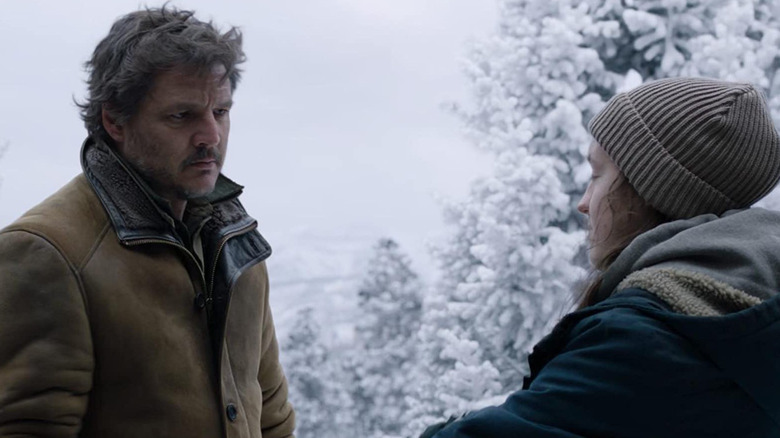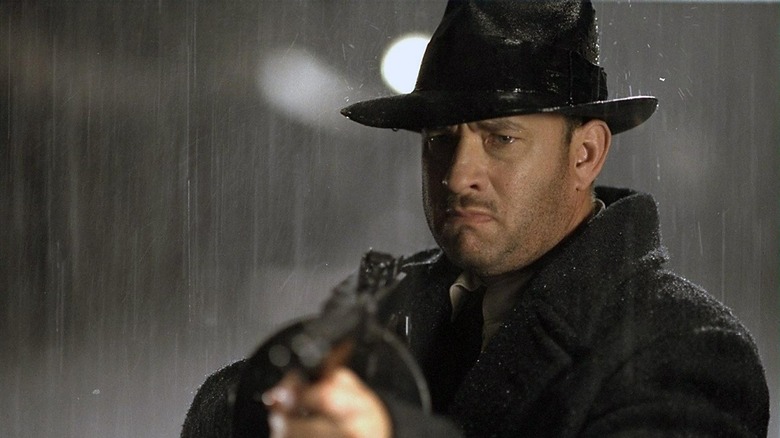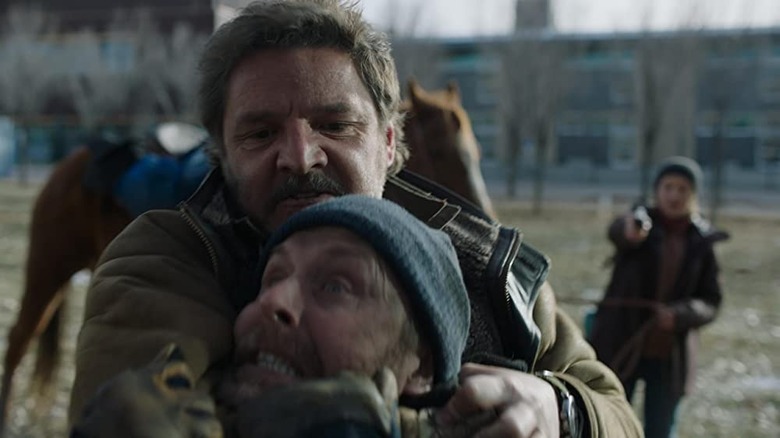How Road To Perdition Helped Shape Joel's Parenting Style In The Last Of Us
Tales of hardened, violent loners picking up lively, younger traveling companions are certainly having a moment. Whether it's "The Last of Us," "The Mandalorian," "The Witcher," or a movie like "The Gray Man," they seem to be every which way you turn in the world of streaming these days. It's nothing new, of course. Writer Kazuo Koike and artist Goseki Kojima helped shape the mold for these types of stories when they launched "Lone Wolf and Cub" in 1970. Even people who've never read their incredibly influential manga series (nor seen any of its adaptations in other media) know exactly what you mean when you describe something as having "Lone Wolf" vibes.
Speaking on the official podcast for "The Last of Us" season 1, episode 6, "Kin," co-creator Neil Druckmann talked a little about his own inspirations while directing the original Naughty Dog video game franchise that inspired HBO's widely acclaimed (and relentlessly feel-bad) post-apocalyptic prestige series. "You know, when I was working on the original game, you know, sometimes when you write genre, you dive as deeply as you can into the genre. You study like every single story in that genre," Druckmann commented.
Look away, look away
Continuing, Neil Druckmann cited the "Lone Wolf and Cub"-styled 2002 period crime drama "Road to Perdition" as a direct influence on "The Last of Us," specifically when it came to the relationship between Joel and Ellie. Calling it "one of my favorite movies," Druckmann pointed out the film is "a little different from the comic book that it's based on, in that Tom Hanks does everything he can to protect his son from ever getting corrupted by violence."
In a sense, director Sam Mendes seeks to emulate mob enforcer Michael Sullivan's (Tom Hanks) efforts to shield his son from his violent lifestyle in the "Road to Perdition" film adaptation. A significant chunk of the violence in the movie transpires off-screen, with only the aftermath glimpsed under the cover of dark, rainy nights or, in one particularly striking composition, in the reflection of a mirror. HBO's "The Last of Us" is similar in that characters scarcely die on-screen (save for the rare grisly exception), with the show opting to cut away to someone's reaction or a haunting, tranquil shot instead. The big difference, however, is that Joel (Pedro Pascal) knows he can only do so much to protect Ellie (Bella Ramsey) from having to commit acts of violence herself.
Indeed, for a story set in a world overrun by fungal monsters, fascist military forces, and all manner of dangerous individuals, Druckmann knew he would have to adjust his protagonist's parenting tactics accordingly.
Learning to use violence as a tool
Neil Druckmann talked about this on the official "The Last of Us" podcast and explained how it shaped his approach to writing the series' leads:
"I think as a dad in that world, if I'm really trying to protect my kid, I'm not gonna protect them from violence. I'm gonna teach them how to use violence as a tool so they will be safe. You know, Joel's been trying to protect [Ellie] from that. Of like never giving her a gun, and then slowly trusting her, but only for emergencies. And now he's slowly teaching her to become more and more of a violent person like him."
In keeping with its complex sense of morality, HBO's "The Last of Us" avoids framing Joel teaching Ellie how to be more violent as either an inherently good or bad thing in the context of the show's post-apocalyptic setting. Even so, you can still see how "Road to Perdition" informed their dynamic. For as much as Joel recognizes violence as a useful and sometimes necessary tool to survive, he resists teaching Ellie how to use it for as long as he possibly can and laments it every time she's forced to take a life, especially as a means of protecting him. For as popular as "Lone Wolf and Cub"-inspired narratives have become of late, few of them explore the true cost of violence to the degree "The Last of Us" does.
"The Last of Us" airs Sundays on HBO and HBO Max.


